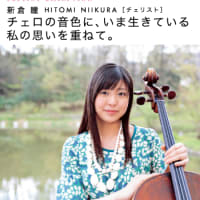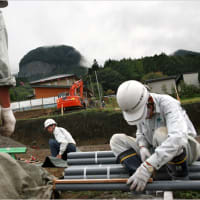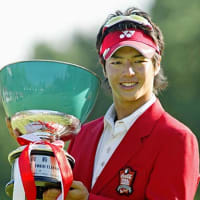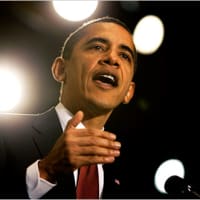
Iran Details Nuclear Ambitions; Rice Urges 'Strong Steps' - New York Times
http://en.wikipedia.org/wiki/Iran
ニューヨークタイムズ紙の抜粋記事:
Iran's recent declarations about its nuclear program drew international criticism and concern today from several countries, including Russia, China, Britain and the United States.
Secretary of State Condoleezza Rice called for "strong steps" from the United Nations Security Council. Asked if Ms. Rice wanted sanctions, the White House spokesman, Scott McClellan, said the United States was consulting with Security Council members about a diplomatic course of action.
Following Tuesday's announcement by President Mahmoud Ahmadinejad that Iran had joined the group of nuclear nations, the deputy head of Iran's atomic energy organization, Muhammad Saeedi, was quoted today as saying Iran had told the International Atomic Energy Agency that it will press ahead and start operating 3,000 centrifuges by late 2006, with further expansion to 54,000 centrifuges planned.
"We will expand uranium enrichment to industrial scale at Natanz," Mr. Saeedi said, referring to Iran's main enrichment plant, according to the ISNA news agency.
Iran's plans for industrial enrichment facilities of some 50,000 centrifuges have been known for some time, but the timing of Mr. Saeedi's remarks today, on the heels of the Iranian president's speech, underscored the country's determination to pursue its long-term program despite international demands that it stop.
Ms. Rice said that President Ahmadinejad's announcement would further isolate Iran and that the Security Council, when it meets again, will need to consider Iran's new move.
"It will be time when it reconvenes on this case for strong steps to make certain that we maintain the credibility of the international community on this issue," she said. "We are consulting now, and when the Security Council reconvenes, I think it will be a good time for action. We can't let this continue."
"Russia also joined the international criticism of Iran's announcement, with a Foreign Ministry spokesman calling it "a step in the wrong direction." The announcement appeared to scuttle Russia's proposed compromise for settling the confrontation over Iran's nuclear program: a joint-venture to enrich uranium outside of Iran, under Russian and international scrutiny.
The Russian foreign minister, Sergy V. Lavrov, however, later tempered Moscow's criticism. He advised against a rush to judgment until after the I.A.E.A director general, Mohamed ElBaradei, ended his latest round of negotiations in Iran, and he noted that Iran had "never stated that it is striving to possess nuclear weapons."
http://en.wikipedia.org/wiki/Iran
ニューヨークタイムズ紙の抜粋記事:
Iran's recent declarations about its nuclear program drew international criticism and concern today from several countries, including Russia, China, Britain and the United States.
Secretary of State Condoleezza Rice called for "strong steps" from the United Nations Security Council. Asked if Ms. Rice wanted sanctions, the White House spokesman, Scott McClellan, said the United States was consulting with Security Council members about a diplomatic course of action.
Following Tuesday's announcement by President Mahmoud Ahmadinejad that Iran had joined the group of nuclear nations, the deputy head of Iran's atomic energy organization, Muhammad Saeedi, was quoted today as saying Iran had told the International Atomic Energy Agency that it will press ahead and start operating 3,000 centrifuges by late 2006, with further expansion to 54,000 centrifuges planned.
"We will expand uranium enrichment to industrial scale at Natanz," Mr. Saeedi said, referring to Iran's main enrichment plant, according to the ISNA news agency.
Iran's plans for industrial enrichment facilities of some 50,000 centrifuges have been known for some time, but the timing of Mr. Saeedi's remarks today, on the heels of the Iranian president's speech, underscored the country's determination to pursue its long-term program despite international demands that it stop.
Ms. Rice said that President Ahmadinejad's announcement would further isolate Iran and that the Security Council, when it meets again, will need to consider Iran's new move.
"It will be time when it reconvenes on this case for strong steps to make certain that we maintain the credibility of the international community on this issue," she said. "We are consulting now, and when the Security Council reconvenes, I think it will be a good time for action. We can't let this continue."
"Russia also joined the international criticism of Iran's announcement, with a Foreign Ministry spokesman calling it "a step in the wrong direction." The announcement appeared to scuttle Russia's proposed compromise for settling the confrontation over Iran's nuclear program: a joint-venture to enrich uranium outside of Iran, under Russian and international scrutiny.
The Russian foreign minister, Sergy V. Lavrov, however, later tempered Moscow's criticism. He advised against a rush to judgment until after the I.A.E.A director general, Mohamed ElBaradei, ended his latest round of negotiations in Iran, and he noted that Iran had "never stated that it is striving to possess nuclear weapons."











![99歳のお婆さんの詩集「くじけないで]](https://blogimg.goo.ne.jp/image/upload/f_auto,q_auto,t_image_square_m/v1/user_image/2d/c0/0a6bfc72611d94be6342873f21567bb8.jpg)








※コメント投稿者のブログIDはブログ作成者のみに通知されます